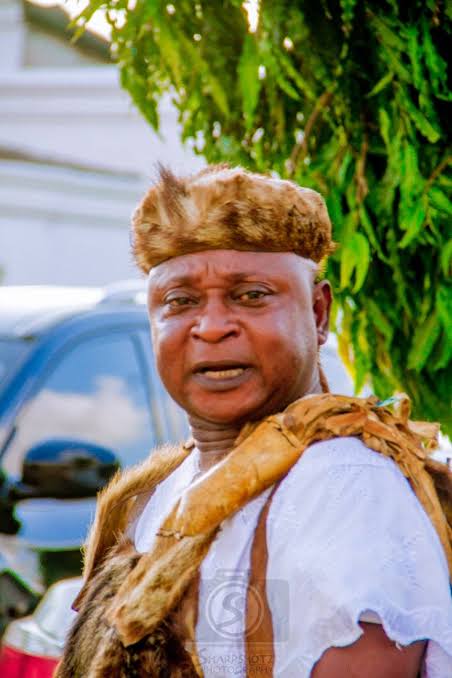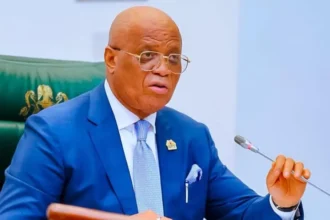The early dawn in Ile-Ife carries a peculiar hush, a silence that is rarely empty. It is a silence pregnant with anticipation, as if the ancient city itself holds its breath, waiting. And from this quiet emerges a voice, melodic yet commanding, weaving the threads of history, identity, and authority into a tapestry that no outsider can fully grasp.
- A Day in the Life: Discipline, Precision, and Spiritual Alignment
- Family, Training, and Ancestral Lineage
- Morning Rituals: Waking the Ooni with Ijala
- The Architecture of Ijala: Crafting Chants that Move Kings
- Ushering the Ooni: The Silent Guidance of Ceremony
- Chants as Tools of Social Cohesion
- The Psychological Dynamics: A King’s Trust
- Beyond the Palace: The Cultural Ambassador
- The Metaphor of Sound as Authority
- The Art of Anticipation: Reading the Moment
- The Chanters’ Circle: Mentorship and Legacy
- Leaving With This: The Invisible Throne
This is the voice of Prince Lateef Omisore Oyewale Oderinde, the man who carries the intangible weight of centuries every morning and at every royal event: the Ooni, Oba Adeyeye Ogunwusi’s praise chanter.
The title “praise chanter,” or more accurately in Yoruba, “Ijala Olori Oba”, belies the depth of influence, tradition, and subtle power that accompanies it. Prince Lateef is not merely reciting words. He is navigating the space between the spiritual and the temporal, between culture and ceremony, between individual identity and communal history.
Through his chants, he awakens, guides, and shapes the rhythm of the Ooni’s presence, making visible the invisible strands that hold Yoruba kingship together.
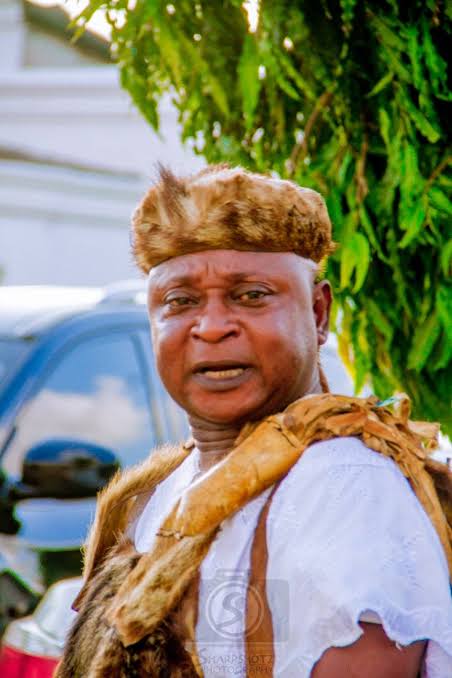
A Day in the Life: Discipline, Precision, and Spiritual Alignment
The life of Prince Lateef Omisore Oyewale Oderinde is a study in devotion and precision. While outsiders may imagine the chanter’s life as simply standing beside the Ooni and chanting, the reality is far more rigorous, bordering on the monastic. Long before the palace gates creak open and the first visitors arrive, Lateef is awake, often at the first whispers of dawn, preparing his mind, voice, and spirit for the day’s demands.
Preparation begins with meditation. In the quiet of his private chamber, he aligns himself spiritually, invoking ancestral guidance and centering his focus on the responsibilities that await. This is not mere ritualistic repetition—it is an internal calibration. Every chant, every syllable, every cadence must resonate with the invisible rhythm of tradition and authority. The Ooni’s day, like a carefully choreographed symphony, depends on the chanter’s discipline to set the tempo.
Vocal exercises are next. Lateef stretches, hums, and modulates his voice with the precision of a musician tuning an instrument meant to reach across centuries. These exercises are designed to strengthen breath control, ensure tonal clarity, and sustain vocal stamina throughout lengthy ceremonies. In Yoruba tradition, the voice of the chanter is sacred; it carries not just praise but the spiritual weight of the ancestors and the legitimacy of kingship. A voice faltering in delivery could unsettle not only the Ooni but also the subtle social harmony of the palace.
Historical review forms another essential layer of his preparation. Prince Lateef studies the lineage of the Ooni, the feats of past rulers, and the cultural events scheduled for the day. He carefully matches the content of his chants to the historical significance of the occasion, ensuring that each performance situates the Ooni within a continuum of leadership, valor, and cultural stewardship.
Finally, he reflects on the Ooni’s schedule, anticipating moments of high visibility and heightened emotional resonance. Whether the king is receiving dignitaries, attending a festival, or performing a private ritual, Lateef adapts his vocal strategies to the context. He considers the audience, the physical space, the symbolic weight of objects and gestures, and even subtle palace politics. This meticulous attention to detail transforms his role from mere reciter to a living instrument of order, authority, and cultural continuity.
Even the smallest deviation—a misplaced syllable, an untimely pause, or an overemphasized tone—could disrupt the ceremonial flow, dilute the intended effect, or unintentionally diminish the Ooni’s projected authority. For Prince Lateef, discipline is not a virtue; it is a necessity. Precision is not perfectionism; it is survival of centuries-old tradition and the sustenance of a culture that views voice as law, and sound as legacy.
Family, Training, and Ancestral Lineage
Prince Lateef’s mastery is not accidental. He hails from a lineage of chanters, steeped in the discipline, oral history, and philosophy of Yoruba leadership. From childhood, he absorbed the subtle cadences, metaphors, and ritual nuances that inform his current practice. His grandfather, a chanter in Ife, reportedly often tell him:
“Ijala is not your voice; it is the echo of the past speaking through you. Respect it, and it will guide your present.”
This philosophy informs his every chant. Every syllable is deliberate, every cadence measured, every pause pregnant with meaning. Prince Lateef is not merely performing; he is channeling centuries of cultural memory.
Morning Rituals: Waking the Ooni with Ijala
Few outsiders witness what happens in the early hours at the Ooni’s palace. Before the sun fully claims the sky, Prince Lateef is already awake, preparing his voice, aligning his spirit. The moment comes when he softly begins, each word resonant with centuries of authority:
“Ọmọ Ifẹ, Ọba ayé,
Tí gbogbo ilé Yoruba fi ń bọ́,
Ọrun àti ilẹ̀ ń gbọ́ ìyìn rẹ,
Ọni ọjọ́ tuntun, a pé ọ níwọ̀n…”
Translation:
“Child of Ife, King of the world,
Whom all Yoruba households revere,
Heaven and earth hear your praise,
On this new day, we honor you…”
This is no casual recital. Every tone is deliberate; every pause carries meaning. As Lateef chants, the Ooni, Oba Adeyeye Ogunwusi, stirs. He rises from his mat, eyes closing briefly in acknowledgment, a silent conversation passing between king and chanter. In these moments, the palace is suspended—not by fear, but by reverence, tradition, and a subtle acknowledgment of the chanter’s unseen authority.
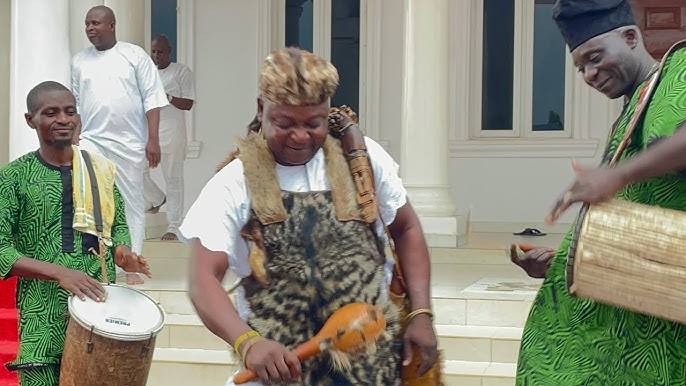
The act of waking the Ooni is not just about beginning the day. It is about harmonizing the living king with the weight of lineage and expectation. Prince Lateef’s voice becomes the bridge, the medium that connects a temporal ruler to a timeless institution.
The Architecture of Ijala: Crafting Chants that Move Kings
Ijala is not improvised; it is a meticulous architecture of syllables, history, and rhythm. Prince Lateef studies the Ooni’s moods, the events of the day, and even the unspoken tensions within the palace. Each chant is tailored:
“Ọba ayé, ọmọ alágbára,
Tí àjànàkú ọgbọ́n ń tọ́ ọ,
Ẹ̀dá gbogbo ń fi ọwọ́ rẹ̀ mọ́,
Tí gbogbo ìpinnu rẹ̀ ń ṣe ìtẹ́wọ́gbà…”
Translation:
“King of the world, child of strength,
Whom the wisdom of elders guides,
All creatures acknowledge your hand,
And all your decisions receive acceptance…”
At a political or cultural event, Lateef may adjust the chant subtly, emphasizing lineage or wisdom, courage or generosity. This is a performance that informs perception: dignitaries leave with a reinforced understanding of the Ooni’s authority; citizens witness the continuity of cultural integrity; even skeptics feel the weight of tradition pressing upon the present.
Ushering the Ooni: The Silent Guidance of Ceremony
Beyond the palace, Prince Lateef’s influence extends into public events. Every procession, every entrance of the Ooni, is choreographed by centuries of ritual and the chanter’s art. When Oba Adeyeye Ogunwusi appears, it is not merely a king stepping forward—it is the culmination of preparation, where the chanter’s voice directs attention, frames authority, and amplifies presence.
“Gbé ọ̀run soke, Ọba Ifẹ,
Ẹ̀rù gbogbo ti bàjẹ́, wọlé!
Ọmọ ilẹ̀, ọmọ àdúgbò,
Ẹ wo ọ, Ẹ sùn mọ́ ọ́!”
Translation:
“Lift the heavens, King of Ife,
Let all disorder bow before you!
Child of the land, child of the neighborhood,
Behold him, embrace him!”
Here, the chanter does more than praise. He orchestrates the atmosphere. The Ooni’s steps, the turning of heads, the collective focus—all flow from Lateef’s mastery. It is a subtle power: invisible to most, yet shaping the perception of authority for everyone present.
Chants as Tools of Social Cohesion
Ijala is also a social instrument. At festivals, palace ceremonies, and civic events, Lateef’s chants articulate moral guidance, communal values, and historical remembrance. They remind the people of unity, resilience, and collective responsibility:
“Ẹ̀yìn wa pọ̀, ọwọ́ wa mọ́ra,
Àṣà wa kì í bàjẹ́, ìgbàlà wa ń tọ́.”
Translation:
“Our backs are together, our hands united,
Our culture does not perish, our destiny is guided.”
Through this, Prince Lateef extends his influence beyond the Ooni, shaping the moral and cultural compass of the community. The chanter becomes both a mirror and a beacon—reflecting tradition while guiding the living.
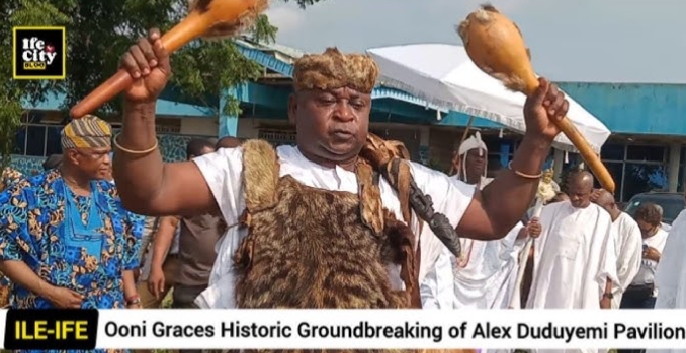
The Psychological Dynamics: A King’s Trust
Few people in the palace enjoy the intimate psychological access that Prince Lateef commands. The Ooni’s moods, stresses, and personal anxieties are filtered, interpreted, and, to some extent, influenced through the Ijala. A chant can calm, embolden, or inspire action. The chanter’s awareness of timing, tone, and context is a subtle psychological instrument:
“Ọba ayé, tẹ́lẹ̀ ẹ̀mí rẹ,
Ẹ jẹ́ kí ọgbọ́n rẹ̀ tọ́ ọ,
Ẹ jẹ́ kí àlàáfíà rẹ̀ yọ̀,
Ẹ jẹ́ kí ìtẹ́wọ́gbà rẹ̀ gba gbogbo…”
Translation:
“King of the world, follow your spirit,
Let wisdom guide you,
Let your peace arise,
Let your acceptance embrace all…”
Here, the chant operates like a balm, a motivator, and a reaffirmation of leadership simultaneously. Few realize that each carefully chosen word is designed to optimize presence, authority, and psychological alignment.
Beyond the Palace: The Cultural Ambassador
Prince Lateef’s influence is also external. When the Ooni attends international events, cultural exhibitions, or political forums, the chanter ensures that Yoruba identity and royal prestige are projected with precision. Through Ijala, he contextualizes, dignifies, and elevates every appearance:
“Ọmọ Ifẹ ń fi ìtàn rẹ̀ hàn,
Àṣà wa ń jó ní gbogbo ilẹ̀,
Ọba wa, ojú gbogbo ayé ń wò ọ…”
Translation:
“Child of Ife displays his history,
Our culture dances across the lands,
Our King, the eyes of the world watch you…”
In these moments, Prince Lateef’s role transcends praise. He becomes a living emblem of Yoruba intellectual and cultural sophistication, ensuring that tradition retains relevance in modern arenas.
The Metaphor of Sound as Authority
In Yoruba cosmology, sound is not merely an auditory phenomenon; it is a force capable of shaping reality. Words, when chanted correctly, become instruments of healing, admonition, blessing, and protection. Prince Lateef embodies this principle with a mastery that extends beyond mere performance. His voice does more than honor the Ooni—it operates as a vessel of governance, a channel through which ancestral authority flows, and a subtle instrument that enforces hierarchy and social cohesion.
The Ijala, as Lateef performs it, is not simply poetry; it is strategic. The cadence of his voice signals timing and order, guiding movements in the palace, the attention of guests, and even the inner state of the king. When he elongates a note, the court is compelled to pause; when he introduces a sharp inflection, he directs focus. In essence, sound becomes a medium of invisible power.
The Yoruba adage often invoked within the palace encapsulates this philosophy:
“Ẹ̀rọ ìjápọ̀ àṣẹ kò kù bí ohùn ti chanter.”
“No throne is secure if the chanter’s voice falters.”
This proverb is a recognition of latent influence: though the king reigns visibly, the chanter sustains the throne’s legitimacy through auditory authority. Prince Lateef’s voice is both a sword and a shield—it can enforce respect, mediate tension, and protect the spiritual and social order of the palace.
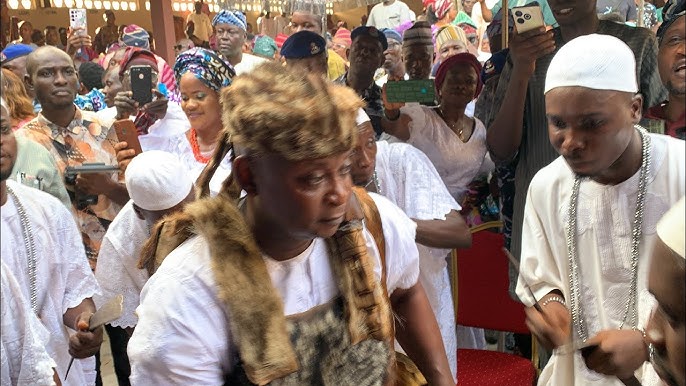
He also wields influence through the selective invocation of history, metaphor, and symbolism embedded in his chants. A reference to a past conquest or ancestral wisdom is never accidental; it reinforces the Ooni’s position as the inheritor of a legacy and the guardian of collective memory. Through sound, Lateef channels power that is invisible to most observers but tangible to those who understand the nuances of Yoruba kingship.
The Art of Anticipation: Reading the Moment
Mastery in Ijala requires more than vocal skill; it demands acute perception and the ability to anticipate the subtle energies of the palace. Prince Lateef’s intuition is informed by decades of observation, historical immersion, and cultural apprenticeship. He gauges moods, tensions, and expectations with a precision that is almost imperceptible to outsiders.
During ceremonies, a subtle shift in the Ooni’s posture, the hushed murmurs of the audience, or the energy in the room signals a need to adjust the chant. Perhaps a syllable must be elongated to emphasize caution, a pause introduced to allow reflection, or a tonal change to highlight triumph or reassurance. These micro-adjustments operate on the level of psychology as much as tradition, ensuring that the atmosphere aligns with ceremonial intent and cultural norms.
This anticipatory skill is not instinct alone; it is cultivated through years of disciplined observation. Prince Lateef has learned to interpret subtle gestures, historical contexts, and unspoken social hierarchies, translating them into vocal performance. In doing so, he transforms sound into an instrument of situational governance—calming anxiety, commanding respect, or signaling unity—all without a single word of overt instruction.
The Chanters’ Circle: Mentorship and Legacy
Prince Lateef’s mastery is inseparable from his commitment to continuity. He understands that the role of Ijala chanter is not a personal accolade but a sacred responsibility to the Yoruba people and the institution of kingship. To safeguard this heritage, he mentors younger chanters, transmitting technical expertise, historical knowledge, philosophical insight, and the subtle psychological strategies embedded in his practice.
Within the chanters’ circle, he emphasizes that Ijala is not merely about recitation—it is about stewardship. Every syllable carries the weight of ancestors; every pause communicates authority; every cadence conveys legitimacy. By training apprentices in both skill and philosophy, Prince Lateef ensures that the power of the chant will persist, even as generations of kings and chanters come and go.
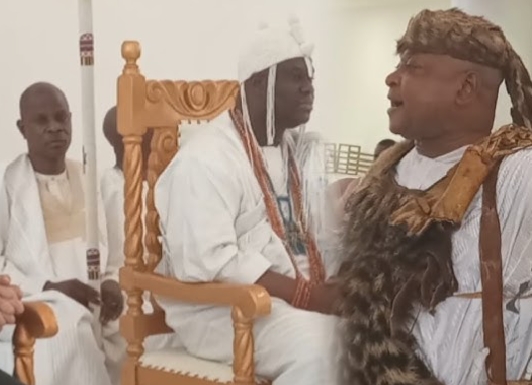
This mentorship extends beyond technical training. Lateef instills a sense of ethical responsibility, emphasizing the moral dimensions of their role. A chanter’s voice is never to be wielded for personal ambition or mischief; it is a medium for the collective good, a tool to preserve cultural dignity, and a mechanism to reinforce unity within the palace and community.
In this way, Prince Lateef has created a lineage not of blood alone, but of voice, discipline, and cultural responsibility. His apprentices inherit not just technique, but a worldview in which sound, silence, and timing are instruments of governance, and in which the chanter is both guardian and architect of Yoruba kingship.
Leaving With This: The Invisible Throne
Prince Lateef Omisore Oyewale Oderinde occupies a space that is simultaneously visible and invisible, tangible and ephemeral. He is a guardian of tradition, a mediator of authority, and a subtle shaper of perception. His Ijala does not merely honor the Ooni; it sustains him, contextualizes him, and, in a sense, completes him.
In the palace of Ile-Ife, the line between power and presence is often blurred. Yet in the resonant voice of Prince Lateef, one can hear the clarity of authority, the weight of heritage, and the invisible threads that bind kingship, culture, and community together.
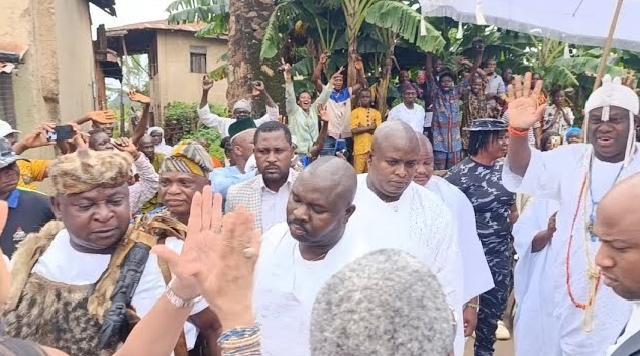
To witness his chant is to glimpse the hidden architecture of Yoruba leadership, a reminder that true power often resides not in the throne, but in the hands—and voice—of those who uphold it.

